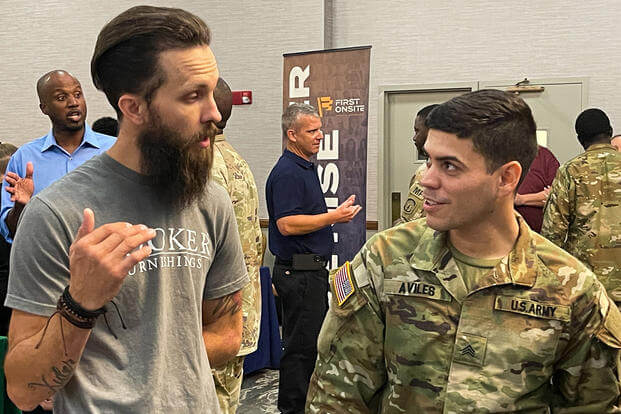Veterans transitioning to corporate jobs face a new kind of challenge: Competing for the same positions against hundreds of people with similar military training. Many veterans wonder how they can stand out to potential employers at career fairs that target members of the military. Here are some simple ways to prepare and boost your confidence.
Carl Savino, CEO and founder of Competitive Edge Services, a Fairfax Station, Virginia-based company that helps veterans transition into civilian jobs, offers advice based on his experience running Corporate Gray Job Fairs, which cater to the military community.
The job fairs typically feature corporate participants such as Northrop Grumman, Lockheed Martin, Cox Communications and Home Depot. Corporate Gray sponsors about 35 career fairs a year, and each usually has 800-1,000 veteran job seekers in attendance.
Savino contends that if you follow five steps, you'll gain an edge in winning interviews.
Dress for the Occasion
Dressing professionally may seem like an obvious requirement, but Savino says this step is too important to overlook. "Appearance is important, because it is the first impression, and that's key," Savino said. "You have to look good. You have to approach [the career fair] as if it is a formal interview. That first impression can be the last impression."
Savino recommends men wear suits. If you don't have a suit, a coat and tie will do. Women must have equivalent attire.
Project a Positive Attitude
"Keep a positive attitude and treat everyone well," Savino said. "You never know who that person is, or whether that recruiter is a hiring manager. So treat everyone you meet with respect."
While this step may seem obvious as well, Savino says he is surprised by how often veteran job seekers walk away from corporate booths when they meet young professionals whom they assume are not managers or do not have hiring authority. Savino cautions against underestimating anyone behind the booth.
Do Your Homework
You can never know too much about potential employers, and it doesn't take much time to learn something. "Take a minute to go to the company's website ... The corporate recruiters tell me that their pet-peeve question from job seekers is, 'What do you do?'" Savino said.
Since most career fairs have employer directories, it's easy to look up information about the companies that will be attending. "Research will help you ask more intelligent questions," he said. "For example, someone who did their homework could say, 'I know you have a contract to provide widgets to the Air Force, and I have training in that area.'"
Your Resume Still Counts
While a sharp first impression, a positive attitude and research may get you an interview, you still need a resume that highlights your key skills and competencies. And having more than one in different formats can't hurt.
"Some companies want to see chronological resumes -- companies with defense contracts, for instance," Savino said. One important resume tip for vets is to be wary of overusing acronyms, a common pitfall for recent veterans.
Don't Drop the Ball
Follow up. "It's a professional touch," Savino said. "So it's important to at least get a person's name and ask for their card. Send an email or mail another, perhaps updated, resume with a cover letter." The cover letter can reiterate why your skills fit the position.
Build Your Network
The final edge you may need is a bigger network to draw on. Savino says the best way to increase your network is by joining corporate associations in your desired sector. You never know who may appear behind one of the career fair booths, and you'll have an edge if you know a few of them.
Finding Career Fairs
Typically, your branch of the military will have a liaison to assist with civilian transition. Marines, for example, have the Marine for Life Network. These offices will have information about upcoming career fairs. Another resource is the Non Commissioned Officers Association, which serves all current and previous members of the armed forces and offers a fair schedule online.
Find the Right Veteran Job
Whether you want to polish up your resume, find veteran job fairs in your area, or connect with employers looking to hire veterans, Military.com can help. Sign up for a free Military.com membership to have job postings, guides and advice, and more delivered directly to your inbox.











